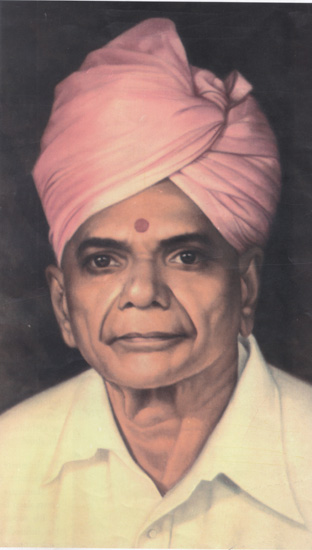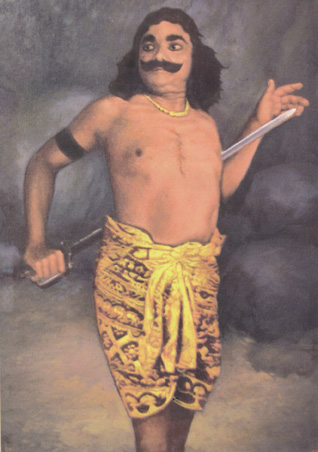
F.G. Natesa Iyer.
|
Tamil Nadu should be grateful for a patron of the arts like F.G. Natesa Iyer of Trichinopoly who discovered and trained great artistes like M.K. Thyagaraja Bhagavatar, K.B. Sundarambal and the T.K.S. Brothers. He projected M.S. Subbulakshmi as a child prodigy when she was 11 and arranged concerts for her with T. Chowdiah and Dakshinamoorthy as her accompanists. Who knows how many more such gems benefited from his training and guidance? His invaluable contribution in elevating terukoothu to sophisticated stage productions was the foundations on which the future of South Indian drama and cinema was solidly built.
FGN was born on November 11, 1880 in the lineage of the famous Adayapalam Appayya Dikshitar. His father, Gangadhara Sastrigal, was a legal adviser in the State of Pudukottai, a vainika and a renowned expert in making musical instruments, including the veena and swarabat. He helped Manpoondia Pillai in his research in perfecting the khanjira. FGN's elder brother was Rao Saheb Ganapati Sastrigal, Dewan of Pudukottai.
Natesan loved music and drama so much that, when his father forced him to abandon his love for them, he ran away from home at the age of ten. He took shelter with Englishmen who brought him up and converted him to Christianity. Twenty years later, dissatisfied with the ability of the priests to clarify his doubts, he met the Kanchi Sankaracharya and, getting satisfactory answers from him, reconverted to Hinduism.
He sacrificed the best part of his life and a major share of his wealth in the pursuit of his passion for theatre. While in the Railways, he is said to have mastered the English language and its diction to the amazement of Englishmen, even without passing the matriculation examination. He memorised all of Shakespeare's plays and enacted them for audiences that included European officers. He organised a drama troupe comprising amateur actors from well-to-do families and produced plays in Tamil like Manohara, Raja Harischandra, and Bhakta Prahlada, as well as Tamil versions of the works of Shakespeare and Sheridan. The plays became the rage with the public because of excellent acting and exciting stage effects.

FGN as Manohara.
|
FGN's six-foot-tall, muscular body and his loud, imperious voice gave him a grand stage personality. Whenever he appeared in the role of a king, the audience was spellbound by his realistic portrayal of the character. The role that shot him to fame was that of Manohara, a rebel king, bound by chains and brought before the ruler, before whom he broke the chains in a sheer show of physical strength. He was so realistic as Othello that his own wife was afraid of him after the show.
The intensity of the drama was the hallmark of FGN productions. Even though he had only petromax lights to illuminate his special stage effects, he was able to create deep feeling and wonder (adbhuta) in the audience by his superb direction, stage management and music. He infused spectacle and colour into his plays with such props as long swords with shiny handles and velvet sheaths which he imported from Peshawar, rich colourful dress material from Bombay, and royal robes designed on the styles used by the nawabs of Lucknow. He went to Bombay and Calcutta to watch Maharashtrian and Bengali plays and incorporated their techniques in his productions. High quality classical music composed by Alathur Venkatesa Iyer was an added attraction of his plays. His acting was inspired; budding actors like the T.K.S. Brothers, M.G. Ramachandran, M.R. Radha and M.K. Radha looked up to him as their ideal and sought his help in furthering their talents and prospects. FGN remained an amateur dramatist all his life, never using his dramatic talents to earn money.
FGN's keen eye was always on the lookout for youngsters with exceptional talent. He identified M.K. Thyaraja Bhagavatar as a future star, trained him for six months for the role of Lohidasa and made him famous overnight. He heard the melodious voice of an unknown girl K.B. Sundarambal during one of his jour-neys and brought her into the limelight. He trained the T.K.S. Brothers for his production of Lava Kusa and brought them adulation. Knowing the value of S.G. Kittappa's music, he extended him lifelong support. He helped M.S. Subbulakshmi stabilise her career by guiding her through the Seva Sadan assignment. (It has been related that MS had stayed in Trichy for several months to learn about acting from FGN.) He fought single-handed to have drama productions exempted from entertainment tax, a concession that the Government continues even today.
A student of Alathur Venkatesa Iyer, FGN was a connoisseur and patron of Carnatic music. He supported many musicians, including Alathur Venkatesa Iyer, all through their lives. He arranged regular concerts of great masters at the 100-pillared hall in the Rock Fort temple under the banner of Rasika Ranjana Sabha. Many young musicians of those days, including Marungapuri Gopalakrishna Iyer, Musiri, Madurai Mani, Palghat Mani, and Semmangudi, owed much to him for their success in their early careers.
Joining the South Indian Railway as a clerk, FGN reached the rank of District Traffic Superintendent by sheer dint of merit. He also served the Trichinopoly Municipal Corporation for several years as a Councillor and was its Chairman for two terms, 1922-24. During his chairmanship, he ensured punctuality and cleanliness at all levels. Trichy had never looked so clean. Drinking water was delivered to every ward through an elaborate system of pipelines. When it was feared that paucity of water could lead to the stoppage of worship in the temple, he arranged a special connection to the Rock Fort temple that delivered water all through the year. Unfortunately, the original granite plaque at the entrance of the fort marking this event was removed in 2008.
In 1924, unprecedented floods in the river Kaveri swept away the only bridge that connected the island of Srirangam to the city. FGN got army-men to build a temporary bridge overnight, evacuated all the residents of Srirangam, and helped avert a big tragedy.
The Muslim and Christian communities had great respect for FGN because of his sense of justice and fairplay. Twice, when Tiruchi was confronted with serious Hindu-Muslim riots, he quelled them with his words of advice to the community leaders.
A patriot to the core, FGN joined the Congress at its Madras session in 1914. His mastery of Hindi and his oratorical skills in English earned him a place in many official committees and he was a member of the delegation to meet Montague and Chelmsford in Madras in 1917 to discuss constitutional reforms. He played a significant role in the Home Rule League movement and helped in the drafting of the Passive Resistance Resolution passed at the Madras provincial conference.
FGN believed that God had endowed him with special abilities and wealth to help others. Serving the people was on the top of FGN's list of priorities. The members of the R.R. Sabha joined him in staging innumerable plays for various public causes like flood relief, earthquake relief, and the war widows' fund. They staged special plays and collected funds for him to build a temple for Manikka Vinayakar inside the Rock Fort. This piece of history has been forgotten.
FGN was the District Commissioner for the Boy Scouts for a number of years. At the World Scouts Jamboree in Madras in 1921, he was presented to the Prince of Wales (later King Edward VIII) who graced the occasion.
FGN's achievement would never have been possible without the ardent support of his wife Rajarajeswari, a woman of great beauty and high spiritual qualities. He spent his last days with his daughter Tirupurasundari in Bhopal and passed away in January 1963. In his memory, the Rasika Ranjana Sabha, Tiruchi, has created a special fund to celebrate his birthday every year and honour an eminent cultural dignitary on the occasion with the FGN Award. – (Courtesy: Sruti.)
|

